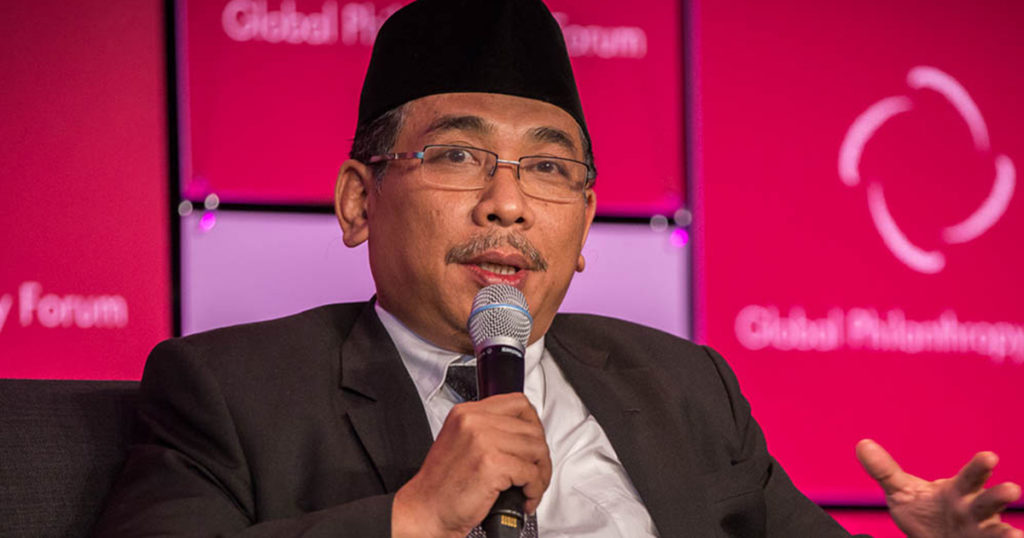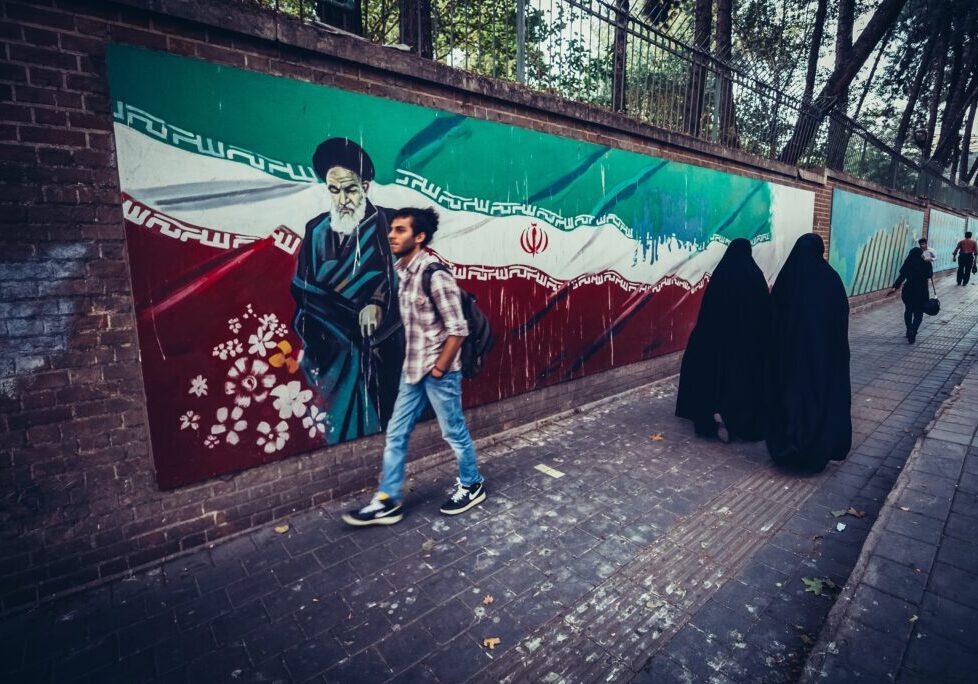Australia/Israel Review
A distinctive Islamic voice against extremism
Nov 11, 2019 | Giora Eliraz

Over the past few years, Nahdlatul Ulama (NU), the largest Muslim organisation in Indonesia and probably in the world, has engaged in a global campaign aimed at countering religious extremism, advancing harmony and understanding between civilisations and curtailing Islamophobia. This campaign, which is supported by the Indonesian Government, carries the theme of Islam Nusantara (Islam of the Indonesian Archipelago). It’s led by several institutions and forums, two of them US-based, devoted to the progressive humanitarian legacy of late Abdurrahman Wahid (1940-2009), NU’s former charismatic leader and the first democratically-elected president of Indonesia.
Yahya Cholil Staquf, the distinguished Muslim scholar who is Secretary-General of NU’s Supreme Council, is the leading figure in the campaign. About two decades ago, he served as presidential spokesman for Wahid and today he serves as an adviser to current Indonesia President Joko Widodo (Jokowi).
The main documents and declarations issued by the NU campaign, along with the public statements about it by Staquf and other key figures, are characterised by the following core messages:
• Islam Nusantara is an orthodox Muslim concept that adheres to the moderate, tolerant teachings and values of Sunni Islam. It articulates the distinctive virtues of the Islam that have been evolved in Indonesia through harmonious coexistence with pre-existing cultures, alongside the Indonesian state ideology, Pancasila, and nationalist ideals. Consequently, it offers an alternative path to meet the local and global challenges of Islam.
• “There is a clear relationship between fundamentalism, terrorism and basic assumptions of Islamic orthodoxy,” as Staquf told Time magazine in 2017. Of particular concern are three areas in Islamic orthodox thought: the relationship of Muslims with non-Muslims, the relationship of Muslims to the state, and their relationship to the prevailing legal system wherever they happen to live.
• The Middle East, which is afflicted by unchecked spread of religious extremism, conflicts and terror, is a great worry. Of particular concern are both Saudi Arabia and Iran – which exploit religious differences and enmity between sects as a political weapon, ignoring the destructive implications. Since the majority of Muslims are Sunnis, it’s the Saudi strategy of propagating Wahhabism and Salafism that has been having particular dangerous effects.
• Islam is not the only factor that causes Muslim minorities in the West to segregate; racism in host nations should also be considered as a causative factor. Hence, there is a need for a global consensus to prevent the political weaponisation of Islam, both by Muslims or non-Muslims, and to curtail the spread of communal hatred.
• There is an urgent need to “reform obsolete and problematic tenets of Islamic orthodoxy”. For this purpose, the Islamic principle of ijtihad (“independent theological reasoning”), through a contextualised approach, should be implemented. This will facilitate replacing hatred, tribal identity and violence with peace, cooperation and harmony between civilisations. While the Middle East lacks the required vitality for conducting such reforms, the NU and Muhammadiya, the second-largest Islamic organisation in Indonesia, can do so, since they have practised ijtihad for a long time.
The campaign suggests some intriguing insights.
Firstly, it must be considered, given the wider history of centre-periphery relations in the Muslim world, as a revolutionary move.
For centuries, Islamic ideas and knowledge travelled from the Middle East to Indonesia; they didn’t flow in the opposite direction. This process has nurtured among Indonesian Muslims an image of Islam in the Middle East as a model of piety and the inspirational centre of Islamic knowledge.
The current NU campaign implicitly challenges this historical pattern. It also attests to a growing self-confidence in Indonesia, both in government and civil society, about its model of Islam. It appears to correspond with growing national self-confidence in Indonesia as an established, increasingly vibrant democracy.
This entire development seems to have been encouraged by comparing Indonesia to the chaotic situation in the Middle East, especially over the last decade. Staquf himself said: “We need to revive the idea of Islam Nusantara as we are confronting the danger of radicalism, to remind Muslims that we have an Islamic civilisation that is different from that in the Middle East.”
Another intriguing insight is that Indonesia can use Islam as a source of diplomatic “soft power” diplomacy by promoting moderate, tolerant, humanitarian Islam. Notably, the government-backed campaign is also interwoven with President Jokowi’s initiative of promoting globally the Islamic notion of wasatiyyah – “Middle Way”.
In fact, both NU and Muhammadiya, the two main pillars of Indonesia’s massive Islamic civil society, are involved in that campaign as well. Indeed, Muhammadiya also contributes to Jakarta’s quest to promote moderate Islam as a form soft power through its vision of Islam Berkemajuan (“progressive Islam”), officially launched in 2015, around the same time as the NU’s Islam Nusantara campaign. But whereas the NU asks for distinctive local characteristics of Islam to be introduced into global Islamic discourse, the vision of Islam Berkemajuan seems aimed mainly at promoting the universal character of Islam.
Interestingly, Islam has never had a significant imprint on Indonesian foreign policy. The current shift can be also explained in part as a reaction to strong concerns, shared by both government and civil society, regarding the effects of religious extremism and terror imported from the Middle East on the multicultural fabric of Indonesian society. It can be also explained by President Jokowi’s interest in strengthening his own Islamic credentials as a response to growing identity politics, as marked by the Islamist symbolism that has been used against him by political rivals.
Efforts to promote the local brand of Islam globally seem to have been the subject of some dispute within the NU itself – while Islam Nusanatra is strongly denounced by Islamists in Indonesia. Observers have been sceptical about the ability of NU to promote messages related to the local brand of Islam throughout the wider Muslim world. So perhaps it is not surprising that the NU seems to find the US and Europe as the most welcoming outlet for its campaign. However, it appears that Islam Nusantara has succeeded in making some headway in Afghanistan and finding a few local advocates in other parts of the Muslim world, such as Turkey, Lebanon and Sudan.
Egypt is an interesting case to discuss in this context. Egyptian President Abdel Fattah al-Sisi, who is strongly motivated to fight religious extremism, has delivered certain suggestive messages that seem to echo NU’s campaign, though it’s hard to point at any explicit connection. For example, al-Sisi called for Muslims to reform the religious discourse (al-khitab al-dini) and to make a religious revolution (thawra diniyya) that is attentive to the contemporary period, and aligns faith with universal values. According to him, it has to be carried out through theological reform, including by resuming the use of ijtihad. It appears he expects Cairo’s al-Azhar University, the closest thing to a supreme religious authority in Sunni Islam, to lead these reforms, but it seems that al-Azhar is not fully responsive. Al-Sisi, in sharp contrast to Jokowi, seems to be missing the key partners he needs to promote his ambitious Islamic reformist agenda.
Last but not least, the spirit of the Islam Nusantara campaign has already implicitly reached Jerusalem, thanks to Staquf’s visit to the city in June 2018. During his trip, Staquf highlighted the Islamic notion of rahmah, another significant message in the NU’s campaign, signifying love and compassion for humanity as a whole, as the key to advancing a solution to the Israeli-Palestinian conflict, establishing a Palestinian independent state, and achieving justice, peace and interfaith harmony between Muslim and Jews.
Dr. Giora Eliraz is an affiliate instructor at the Jackson School of International Studies at the University of Washington, Seattle; a research associate at the Harry S. Truman Institute for the Advancement of Peace at the Hebrew University in Jerusalem; and a research associate at the Forum for Regional Thinking (FORTH).
Tags: Indonesia, Islam, Islamic Extremism, Middle East






